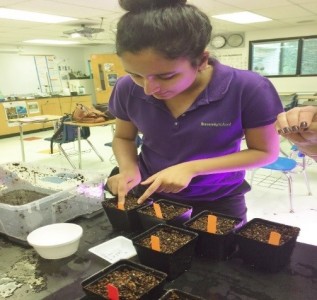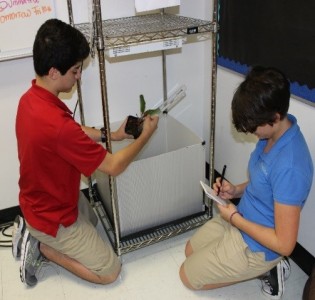NSU Newsroom
SharkBytes
Horizons
This version of NSU News has been archived as of February 28, 2019. To search through archived articles, visit nova.edu/search. To access the new version of NSU News, visit news.nova.edu.
This version of SharkBytes has been archived as of February 28, 2019. To search through archived articles, visit nova.edu/search. To access the new version of SharkBytes, visit sharkbytes.nova.edu.
Students Partner with NASA and Fairchild Garden on Space Research
Astronauts aboard the International Space Station are in for a much needed treat as scientists at The National Aeronautics and Space Administration (NASA) plan to add more vegetables and plants to the astronauts’ existing food options.
Growing plants and vegetables in space is no easy task, so NASA has partnered with the Fairchild Tropical Botanical Garden to research which plants and vegetables grow best aboard the International Space Station’s plant growth facility. As part of this partnership, high school and middle school students have the opportunity to collaborate on this groundbreaking botanical research project.
NSU University School students, eager to gather data for NASA, are participating in the research through the award winning Fairchild Tropical Botanic Garden: Fairchild Challenge. Samy Guimez, a ninth grade student exclaimed, “I could not miss an opportunity to work with NASA to discover which plants grow best in space.”
As part of the experiment, Guimez and other Upper School students will grow a diverse group of plants and vegetables in a confined, controlled school environment, identify the best species for microgravity, and experiment with different elements that inhibit or enhance plant growth. In addition, the students must use equipment provided by Fairchild to mimic the environment in space.
Melanie Cohen, USchool teacher and project facilitator said, “For each of the 3 different required trials, red romaine lettuce is the control group and plants such as misome, nasturtium, carrots and red shiso are the experimental groups.” Mrs. Cohen went on to say that students are experimenting with factors that may influence growth, development, flavor and nutrition. The project requires students to enter the plant data onto an online spreadsheet once per week and share the information on Twitter. At the end of the project, NASA will use different students’ data to determine which plants would grow best in the space station plant facility.
Janay Cypress, NSU University School Junior, explained that she was most interested in the harvesting stage during the first trial. She added, “Not all of the plants and vegetables grew well under the controlled conditions, but I was excited to see how much they changed each week.” You can follow the students’ research on Twitter by going to: USchool Upper Sci. The second trial ends on December 16, 2015 and the third trial will begin mid-January.
The Fairchild Challenge is an annual, interdisciplinary, environmental science competition designed to engage students of diverse interests, abilities and talents to explore the natural world. There are ten different challenges that USchool students plan to participate in. So far, NSU University School students have won awards in Challenge 1, Designs: Million Orchid Lab and Challenge 2, Global Challenge: Environmental Change. And congratulations to teacher Melanie Cohen, who won second place in the Fairchild Challenge Educator Design.

